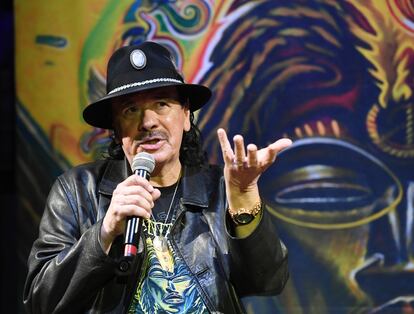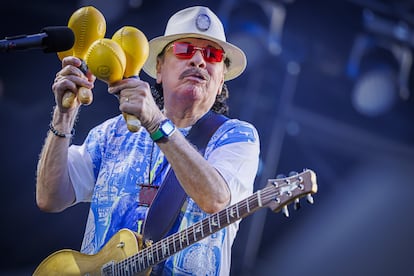The Mexican guitarist Carlos Santana (Autlán de Navarro, Jalisco, 78 years old) assures that, every time Spain visits, he performs “the same ritual”: approaching Malaga in search, again and again, the genius of Pablo Picasso. He has done it in different private visits: locking himself in the museum dedicated to the painter in his hometown, as a kind of Güija that connects artists beyond life. “I identify with Picasso, who was a brave person. He, to start a new work, left everything else aside: his personal life, women, family, any distraction … He got rid of everything brutally to paint and only then could he create a masterpiece (Masterpiece) completely different. ”. Drawed hat and speech halfway between religious experience and artistic memory, this living legend of the electric guitar serves El País by videoconference from a hotel in Milan, north of Italy, before stepping on Spanish soil this summer this summer in which it will be its first tour of the country in twenty years.
Talk with emotion of this reunion: of the master of the Flemish guitar Paco de Lucía, with whom he visited Andalusia also on several occasions; by Joaquín Rodrigo and his Aranjuez concert – “That I learned to play from a little boy,” he clarifies – and of all the mixing of cultures and music that, leaked, result in what he calls “sounds of Spain.” “We have that in common, what do you call it? The Goblin. And everything that the Moors left, and the gypsies. We come from Africa, what people call Latin music is African music,” explains in a conversation dotted with English, of multiple references to God and his childhood. Also of memories of the violinist’s son of a mariachi set that He betrayed The instrument that had touched him in inheritance when he discovered the guitar with eight years, influenced mainly by Ritchie Valens, the American musician who shares with Santana his Mexican origin and for which, the day he died in a plane accident before turning 20, he was baptized as “the day that music died.”
In these two decades of absence – as we see, not from the country but of its scenarios – the career of this unlawful virtuous, known for merging rock and blues With Afro -Attached rhythms, and survivor of the Woodstock Festival poster in 1969, he has not stopped stepping on the top of musical success. Reflect with a foot on the past, but with your gaze towards a horizon that seems still distant. “We are stronger and clearer now,” he says during the interview, always in the first person of the plural.
This last Sunday, July 20, Carlos Santana turned 78. Of these, more than 60 has passed them on stage. Also celebrates – what brings him through Europe with his tour Oneness Tour— the 25 of his fetish album, Supernaturaland is condemned to take stock: “That album had God’s hand on the hand to get a frequency, sound and universal vibration.” It was undoubtedly its most commercial success, with 15 platinum albums and eight Grammy awards won on the same night, in a deed that Michael Jackson has only been able to match him.
At the hand of God, the producer Clive Davis, a fundamental piece in this Copernican turn in the career of Carlos Santana, which already had 17 previous albums, but who threw the world as one of the fundamental musicians of the twentieth century: “It gave me the opportunity to reach the four corners of the world, not a tourist, Santana is not a tourist, Santana is part of the family. Africa or Spain.

This is what they will expect to find the spectators who go to their four appointments in Spain: the tour begins at the Palau Sant Jordi in Barcelona this Saturday, July 26; And that will continue on the nights of the Botanist in Madrid (July 28 and 29), Valencia (July 31), Murcia (August 1), Starlite of Marbella (August 3) and, finally, the Mexican will put the collapse to the Uncle Pepe Festival of Jerez de la Frontera, in Cádiz, on August 4.
Considered one of the 20 best guitarists of all time, Carlos Santana brings to Spain a guitar that, for him, is much more: “It is a voice.” And he continues to remember his beginnings: “My father had left San Francisco and my brothers and I lived in Tijuana with my mother. She did not want to waste all the time I had invested with my father studying music, grabbed me by the hand and took me to the municipal park: there was a group, the Tijuanense, the leader was called Javier Bátiz (known as the precursor of the Mexican rock). For the first time, the electric guitar, my whole body electrified me.
Even so, Santana says that he continues to be considered a beginner, and with this attitude he will come to Spain: “In the hands of God” and with the certainty that getting in front of the Spanish public and plays the guitar is “how to make love in front of many people: he has an exhibitionist point.” “I play the guitar as if I couldn’t touch it, because there is the virgin and innocence. A musician without innocence is like a parake french kiss.

